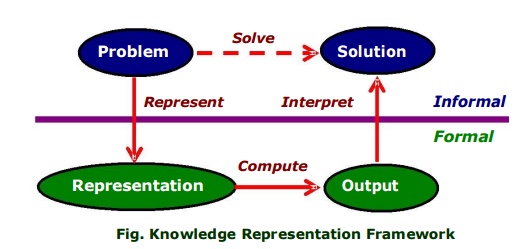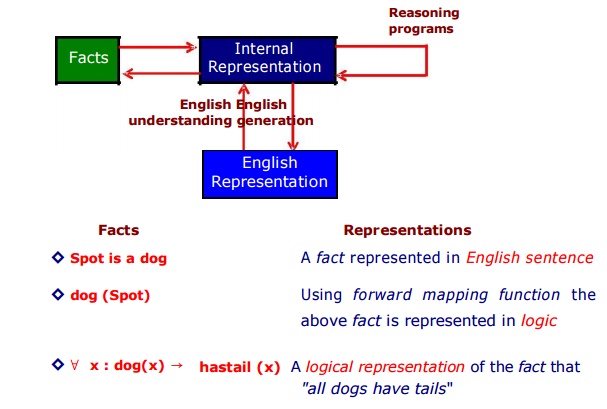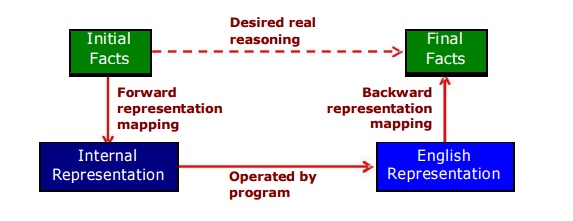Chapter: Artificial Intelligence(AI) : Knowledge Inference
Framework of Knowledge Representation (Poole 1998)
Framework of Knowledge Representation (Poole
1998)
.
Computer requires a well-defined
problem description to process and provide well-defined acceptable solution.
To collect fragments of knowledge
we need first to formulate a description in our spoken language and then
represent it in formal language so that computer can understand. The computer
can then use an algorithm to compute an answer. This process is illustrated
below.

The steps are
The informal formalism of the
problem takes place first.
It is then represented formally and
the computer produces an output.
This output
can then be represented in a informally described solution that user
understands or checks for consistency.
Note : The Problem solving
requires
formal knowledge
representation, and conversion of
informal knowledge to formal knowledge , that is conversion of implicit
knowledge to explicit knowledge.
Knowledge and Representation
.
Problem solving requires large amount of knowledge
and some mechanism for
manipulating that knowledge.
The Knowledge and the Representation are distinct entities, play
a central but distinguishable roles
in intelligent system.
Knowledge is a description of the world;
it determines a system's competence by what it
knows. − Representation is the way knowledge is encoded;
it defines the system's performance in doing
something.
In simple words, we :
need to know about things we want to represent ,
and
need some means by which things we can
manipulate.
◊ know things to represent
‡ Objects -
facts about objects in the domain.
‡ Events -
actions that occur in the domain.
‡ Performance -
knowledge about how to do things
‡ Meta- -
knowledge about what we know knowledge
◊ need means
‡ Requires -
to what we represent ; to manipulate some
formalism
Thus, knowledge representation can be considered
at two levels :
knowledge level at which facts are described,
and
symbol level at which the representations of the
objects, defined in terms of symbols, can be manipulated in the programs.
Note : A good representation enables fast and
accurate access to knowledge and understanding of the content.
Mapping between Facts and Representation
Knowledge is a collection of “facts” from some domain.
We need a representation of "facts" that can be
manipulated by a program. Normal English is insufficient, too hard currently
for a computer program to draw inferences in natural languages.
Thus some symbolic representation
is necessary.
Therefore, we must be able to map "facts to symbols" and "symbols to facts" using forward and backward representation
mapping.
Example : Consider an English sentence


Forward and Backward Representation
The forward and backward representations
are elaborated below :

The doted line on top indicates the
abstract reasoning process that a program is intended to model.
The solid lines on bottom indicates
the concrete reasoning process that the program performs.
KR System Requirements
A good knowledge representation
enables fast and accurate access to knowledge and understanding of the content.
A knowledge
representation system should have following properties.
Representational
Adequacy:
The ability
to represent all kinds of knowledge that are needed in that domain.
Inferential
Adequacy:
The ability
to manipulate the representational structures to derive new structure
corresponding to new knowledge inferred from old .
◊ Inferential
Efficiency :
The ability
to incorporate additional information into
the knowledge structure that can be used to focus the attention of the
inference mechanisms in the most promising direction.
◊
Acquisitional Efficiency:
The ability
to acquire new
knowledge using automatic methods
wherever possible rather than reliance on human intervention.
Note : To date no single system can
optimizes all of the above properties.
Related Topics